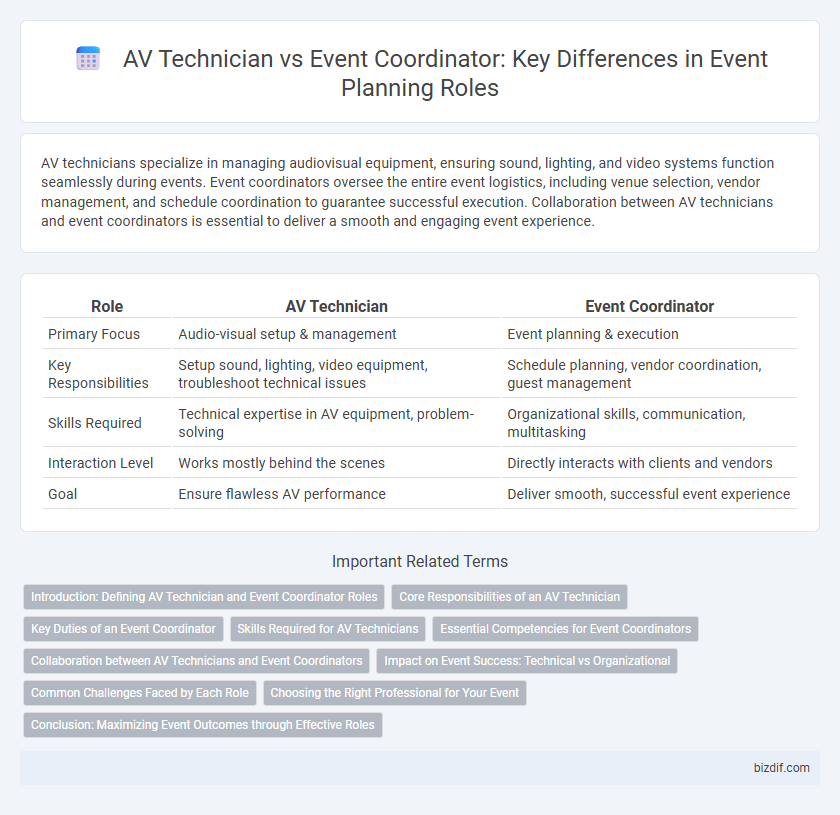AV technicians specialize in managing audiovisual equipment, ensuring sound, lighting, and video systems function seamlessly during events. Event coordinators oversee the entire event logistics, including venue selection, vendor management, and schedule coordination to guarantee successful execution. Collaboration between AV technicians and event coordinators is essential to deliver a smooth and engaging event experience.
Table of Comparison
| Role | AV Technician | Event Coordinator |
|---|---|---|
| Primary Focus | Audio-visual setup & management | Event planning & execution |
| Key Responsibilities | Setup sound, lighting, video equipment, troubleshoot technical issues | Schedule planning, vendor coordination, guest management |
| Skills Required | Technical expertise in AV equipment, problem-solving | Organizational skills, communication, multitasking |
| Interaction Level | Works mostly behind the scenes | Directly interacts with clients and vendors |
| Goal | Ensure flawless AV performance | Deliver smooth, successful event experience |
Introduction: Defining AV Technician and Event Coordinator Roles
An AV technician specializes in installing, operating, and troubleshooting audio-visual equipment to ensure seamless sound and visual presentations during events. An event coordinator manages the overall logistics, including scheduling, vendor communication, and attendee experience, to ensure the event runs smoothly from start to finish. Understanding the distinct responsibilities of AV technicians and event coordinators is crucial for successful event execution and efficient teamwork.
Core Responsibilities of an AV Technician
An AV technician specializes in setting up, operating, and troubleshooting audio-visual equipment to ensure seamless presentations and live event productions. Their core responsibilities include managing sound systems, lighting controls, video displays, and recording devices, as well as performing technical rehearsals and on-site adjustments. Unlike event coordinators who handle logistics and guest management, AV technicians focus exclusively on the technical aspects crucial for event success.
Key Duties of an Event Coordinator
Event coordinators manage event logistics, including venue selection, vendor coordination, and schedule oversight to ensure seamless execution. They handle communication between clients, suppliers, and staff while managing budgets and troubleshooting onsite issues. Unlike AV technicians who focus on audio-visual setup and technical support, event coordinators oversee the overall event planning process from concept to completion.
Skills Required for AV Technicians
AV technicians must possess technical expertise in operating audiovisual equipment, sound systems, lighting rigs, and video displays to ensure seamless event execution. Strong troubleshooting skills and the ability to work under pressure are essential for resolving technical issues quickly during live events. Familiarity with industry-standard software and hardware, along with effective communication skills to collaborate with event coordinators, enhances their role in delivering high-quality audiovisual experiences.
Essential Competencies for Event Coordinators
Event coordinators must possess strong organizational skills, effective communication, and problem-solving abilities to manage logistics, vendors, and client expectations efficiently. Unlike AV technicians who specialize in technical aspects such as sound, lighting, and equipment setup, event coordinators oversee the entire event execution, ensuring seamless integration of all components. Key competencies include time management, negotiation skills, and adaptability to handle dynamic event environments and deliver successful outcomes.
Collaboration between AV Technicians and Event Coordinators
AV technicians and event coordinators collaborate closely to ensure seamless audiovisual execution and overall event success. AV technicians manage technical equipment setup, troubleshooting, and live event production, while event coordinators oversee event logistics, schedules, and vendor communication. Effective collaboration between these roles enhances attendee experience by aligning technical capabilities with event objectives and timelines.
Impact on Event Success: Technical vs Organizational
AV technicians ensure seamless audiovisual experiences by expertly managing sound, lighting, and video equipment, directly impacting the technical quality and attendee engagement of an event. Event coordinators focus on organizational aspects such as scheduling, vendor management, and logistics, driving overall event flow and guest satisfaction. Both roles are critical; the technician's technical precision enhances atmosphere while the coordinator's strategic planning ensures smooth execution and success.
Common Challenges Faced by Each Role
AV technicians often face challenges related to technical malfunctions, equipment setup complexities, and real-time troubleshooting during events. Event coordinators struggle with managing vendor schedules, handling last-minute changes, and ensuring seamless communication among diverse teams. Both roles require quick problem-solving skills and adaptability to meet the dynamic demands of event execution.
Choosing the Right Professional for Your Event
Choosing the right professional for your event depends on specific needs: an AV technician specializes in managing audiovisual equipment, ensuring sound, lighting, and visual presentations run smoothly. Event coordinators oversee the overall logistics, vendor management, and scheduling to guarantee seamless event execution. Assess the technical complexity and organizational scope to decide if your event requires focused AV expertise or comprehensive coordination.
Conclusion: Maximizing Event Outcomes through Effective Roles
Maximizing event success relies on the complementary roles of AV technicians and event coordinators, where AV technicians ensure flawless technical execution of audiovisual elements, and event coordinators manage logistics, vendor relations, and guest experience. Clear communication and collaboration between these roles enhance operational efficiency and attendee satisfaction. Leveraging their specialized skills creates a seamless event environment, driving optimal outcomes and memorable experiences.
AV technician vs Event coordinator Infographic

 bizdif.com
bizdif.com